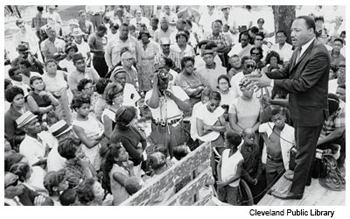Like many of our nation's cities, we find Cleveland a teeming cauldron of hostility. The citizens of the Negro community reflect the alienation of the total community, which has constantly ignored their cries for justice and opportunity and responded to their joblessness, poor housing and economic exploitation with crude methods of police repression rather than compassion and creative programming .
Rev. Dr. Martin Luther King Jr.
Olivet Institutional Baptist Church, Cleveland, Ohio
May 16, 1967
A couple months after Dr. Martin Luther King Jr. made these remarks in Cleveland and following a series of uprisings around the nation, President Johnson appointed a commission to examine the causes of civil unrest to prevent re-occurrence.
Upon completion of their analysis The National Advisory Commission on Civil Disorders, commonly referred to as the
Kerner Commission , reached a conclusion: “Our nation is moving towards two societies, one black, one white—separate and unequal.”
The Kerner Commission examined 12 deeply held grievances, ranked them by level of intensity and provided recommendations. The first on the list of grievances was police practices, followed by unemployment/underemployment, and inadequate housing.
Sound familiar?
The commission called on city governments and police authorities to: “Review police operations in the ghetto to ensure proper conduct by police officers, and eliminate abrasive practices.”
Forty-seven years after Dr. Martin Luther King Jr.’s remarks and the Kerner Commission’s recommendations on policing not much has changed. You can literally stamp 2014 on the speech and the report because all still apply with one exception.
We don’t call black people negroes anymore because it’s considered rude. However, treating black people in the same punitive manner or even worse than in the 60s is widely accepted by many systems.
Read USA Today’s and the ACLU’s reports on disparate arrests.
So where are we today in terms of policing?
USA Today recently released an interactive report that highlights “staggering disparity” in arrest rates around the country. Read the
report to see if your local police department has racially disparate arrest rates.
But before you let your mind wander into thinking that black people commit more crimes than other groups, you may want to read the
ACLU’s report that found that black people were more likely to be arrested for committing the same offenses as their white counterparts.
Read our previous blog post, “The Real Problem in Ferguson.”
After you have reviewed these reports ask yourself if you live or work in or near a community with high disparate arrest rates. Are those arrest rates similar or worse than Ferguson, Missouri?
Maybe these reports and the situation in Ferguson or in your community will propel us to demand fairness in policing for all people. Maybe we will stop looking for excuses to justify racial inequity in arrest rates.
Or maybe we will continue to ignore these problems and accompanying civil unrest for another 47 years. It’s up to us.

